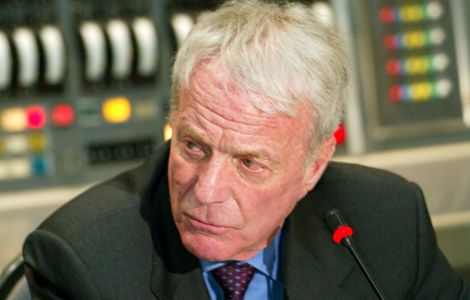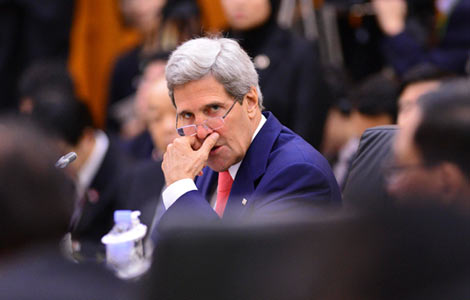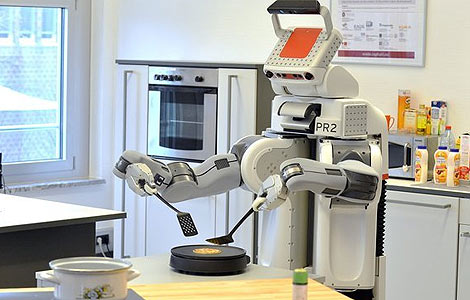Partners on cutting-edge frontier
Updated: 2013-10-11 07:23
By Robert Lawrence Kuhn (China Daily)
|
||||||||
China and the United States could collaborate on a host of high-tech projects that are mutually beneficial
China and the US need common ground. How to find this magic land? (Finding grounds of contention, even of confrontation, is sadly not hard.) Sure, there is thwarting terrorism, avoiding financial crises, containing global warming, preventing infectious diseases, interdicting drug trafficking and fighting organized crime. Important, but these deeds are good because they proscribe bad things. What about good deeds that promote good things?
Our best bet is on technology, where benefits are synergistic, not zero-sum; accretive, not depletive; multiplicative, not (necessarily) competitive. With technology, the more you use it, the more you have it. Green technologies and alternative energy are exemplars. A priority, I suggest, should be information technology because IT enhances all aspects of contemporary society and improves multiple facets of human lives.
Recently I helped catalyze an annual China-US "summit", called IT 2020, on the future of cloud computing and big data analytics, in which computer and IT scientists from China and the US met in candid and collegial engagement (www.it2020.net). Co-hosted by the Chinese Academy of Engineering and EMC Corporation, and held at CAE headquarters in Beijing, IT 2020 focuses on the opportunities and challenges of establishing robust and trustworthy cloud computing and of developing paradigm-shifting applications in big data.
The Chinese Academy of Engineering is comprised of elected members; to be a CAE "member" (also called "academician") is to hold the highest honor in China's engineering and technology communities. CAE promotes scientific excellence and supports policy decision-making of the nation's leaders by conducting strategic studies and providing consultancy on all matters of engineering and technology. EMC Corporation and its federated companies are global leaders in cloud computing (VMware), big data (Pivotal), Internet trust/security (RSA), and data storage (EMC).
The worldwide revolution brought about by IT is accelerating, changing familiar patterns. Mobile technology, social networking platforms, and various new-generation applications are melding, thus transforming the way information is used. But the IT revolution cannot just "happen". It requires advanced technology platforms, including systematic structuring and integration, new hardware design, novel operating systems, industry-specific applications, and the like. It also requires fresh guidelines to handle big data analytics, diversified businesses, creative technologies, society and government implementation, and data robustness, protection and privacy.
IT 2020 emphasizes new ways of thinking by bringing together experts, scholars, scientists and executives from around the globe. Over 300 technology leaders from industry and academia attended the first IT 2020 "summit", whose subtext is active cooperation between China and the US in the long process of gathering, sharing, and discussing ideas and technologies on the frontier of the IT revolution. Through IT 2020, CAE and EMC/VMware aim to establish a platform where new thought patterns enable IT to develop as a new form of wealth, an opportunity for innovation, and a driving force for industrial transformation and social progress.
China has emerged as a global center of this global revolution, and this is the reason why the first IT 2020 was convened in Beijing. Chinese experts, such as CAE member Gao Wen, professor of computer science at Beijing University and vice-chairman of China's National Natural Science Foundation, joined their international peers to examine cloud computing and big data through different perspectives. China is a significant and growing market for IT and is increasingly influencing the global industry.
In the cloud computing session, Cao Shumin, president of the Chinese Academy of Telecommunications Research under the Ministry of Industry and Information Technology, and Pat Gelsinger, CEO of VMware, shared ideas and insights on how cloud computing would change technology and the user experience, and how all this will impact the social and economic challenges facing China and the world. Given that Gelsinger estimates that by 2020 over 60 percent of all cloud computing will be consumed by the US and China markets, the "criticality", he said, of such US-China discourse and collaboration is obvious.
In the big data session, Zhang Liangjie, Chief scientist and senior vice-president of Kingdee International Software Group, and Jeremy Howard, president and chief scientist of Kaggle, stressed that massively growing data - which humanity is accumulating with increasing volume and velocity - will radically alter whole categories of commerce, and that meaningful insights from big data can disrupt private and public sector practices, thereby unlocking business and societal value. Howard showed how machine learning can solve seemingly intractable problems by applying new techniques of data analysis even without content-specific expertise.
Healthcare and medical research are a prime application area, especially with China's leaders committed to improving substantially the healthcare of its vast population, and with containing healthcare costs having become an urgent worldwide imperative. Isaac Kohane, director of Biomedical Informatics Center of Harvard Medical School, explained how big data approaches to disease treatment and prevention, especially leveraging each individual's unique genome (DNA sequence), will revolutionize medicine.
A recurring theme is building trust in the cloud, making sure that data continues to be robust and indestructible as well as private and secure - key concerns to overcome in order to enable further progress.
Wu Hequan, a leader in optical and broadband networks and a pioneer of China's next generation Internet project, and former vice-president of CAE, called for experts on both sides of the Pacific to sit at the same table brainstorming the key technological challenges facing both China and US. William Teuber Jr., vice-chairman of EMC, suggested that thought leaders of multinational corporations, especially those in technology, consider their Chinese peers as co-development partners, not only for proper participation in the Chinese market but also, as a matter of necessity, for maintaining worldwide competitiveness.
This is a critical year. As cloud computing and big data begin to transform industry and society, particularly consumer markets (such as financial services), it is apropos that IT 2020 has commenced as a China-US partnership.
I try to be an optimist about US-China relations, though "facts on the ground," as they say, often get in my way. What I witnessed at IT 2020 bolsters my optimism.
The author is an international corporate strategist advising multinationals on doing business in China.
(China Daily USA 10/11/2013 page15)
Most Viewed
Editor's Picks

|

|

|

|

|

|
Today's Top News
Nobel literature winner's work snubbed in China
Opportunity knocks for US businesses
KFC needs new faces, not new ad campaign
Trending news across China on Oct 11
Xi ignites Australia's zeal for FTA deal
Fire at Fukuoka hospital leaves 10 dead
Yellen will focus on domestic economy
IMF cautions over DC debt drama
US Weekly

|

|














